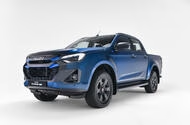How Does the Isuzu D-Max EV Change the Game for Electric Pickups in the UK?
If you’ve been waiting for a practical electric pickup that doesn’t compromise on toughness, the Isuzu D-Max EV might just be the answer. Set to hit UK showrooms in February 2026, this all-electric version of Isuzu’s popular workhorse is making waves as one of the first electric pickups available on British roads. But what makes it stand out, and is it really up to the job? Let’s dig into the details.
What’s Under the Hood (or Floor) of the D-Max EV?
Forget the old diesel rumble—Isuzu’s first EV swaps out the traditional engine for a pair of electric motors, one on each axle. Together, they deliver 188bhp and 240lb ft of torque, which translates to a 0-62mph sprint in just over 10 seconds. Not exactly sports car territory, but more than enough for everyday driving and tough jobs.
The real heart of the D-Max EV is its 66.9kWh battery, tucked neatly under the floor. This setup gives you a WLTP range of 163 miles on a single charge. While that might not rival some electric SUVs, it’s a solid figure for a pickup—especially one designed to haul and tow. Charging is straightforward too: with a 50kW rapid charger, you can top up from 20 to 80 percent in about an hour. That’s a quick coffee and a sandwich, and you’re back on the road.
Can the D-Max EV Still Handle Tough Terrain and Heavy Loads?
One of the biggest concerns with electric pickups is whether they can really handle the rough stuff. Isuzu’s answer? Absolutely. The D-Max EV keeps the brand’s signature ladder chassis but swaps out the old leaf springs for a bespoke de Dion rear suspension. The result is a smoother ride and better handling, both on and off the tarmac.
Ground clearance sits at a healthy 210mm, and it’ll wade through water up to 600mm deep. Approach and departure angles (30.5 and 24.2 degrees, respectively) mean it’s not afraid of steep inclines or muddy tracks. Permanent four-wheel drive and a dedicated Rough Terrain Mode round out the package, so you’re not left wishing for the old diesel when the going gets tough.
But what about payload and towing? The D-Max EV is rated to carry over 1,000kg in the load bed and can tow up to 3,500kg—matching the best in the business. Isuzu hasn’t yet released figures on how towing affects range, but it’s fair to expect a drop, as with any EV. Still, for most users, the capability is there when you need it.
How Does the D-Max EV Compare to Its Diesel Sibling and Rivals?
Let’s talk numbers. The D-Max EV starts at £59,995 (excluding VAT) for the extended cab, with the double cab coming in at £60,995. That’s a significant jump from the diesel D-Max, which starts at £36,755. But you’re getting a lot more tech and future-proofing for your money.
Inside, the EV is almost identical to the diesel model. Expect a modern cabin with a touchscreen infotainment system (complete with smartphone mirroring), a digital driver’s display, dual-zone climate control, parking sensors front and rear, and heated front seats. In short, it’s as comfortable and well-equipped as you’d hope for a truck at this price.
When it comes to competition, the D-Max EV squares up against the Maxus eTerron 9 (from £53,000) and the upcoming KGM Musso EV. While the Maxus undercuts Isuzu on price, the D-Max’s reputation for reliability and its off-road credentials could tip the scales for many buyers.
Is the D-Max EV Worth the Investment for Businesses and Everyday Drivers?
For fleet managers and small business owners, the D-Max EV offers a compelling mix of practicality and sustainability. With the UK government’s push towards zero-emission vehicles and the growing number of low-emission zones, going electric isn’t just about being green—it’s about future-proofing your business.
The upfront cost is higher, but running costs should be significantly lower. Electricity is cheaper than diesel, and maintenance on EVs tends to be less intensive—no oil changes, fewer moving parts, and less wear and tear on brakes thanks to regenerative braking. According to the UK Department for Transport, electric vehicles can save owners up to 50 percent on fuel and maintenance over five years compared to their diesel counterparts.
What Should You Watch Out For?
No vehicle is perfect, and the D-Max EV is no exception. The range is solid for a pickup, but if you’re regularly towing heavy loads over long distances, you’ll need to plan your charging stops. The UK’s charging infrastructure is improving rapidly, with Zap-Map reporting over 53,000 public charging connectors as of early 2024, but rural areas can still be patchy.
Another thing to consider is payload and towing impact on range. While Isuzu hasn’t published official figures, real-world testing of similar electric pickups suggests range can drop by 30-40 percent when fully loaded or towing. For most users, that’s manageable, but it’s worth factoring into your planning.
The Bottom Line: Who Is the D-Max EV Really For?
If you need a tough, reliable pickup that’s ready for the electric age, the Isuzu D-Max EV is a serious contender. It’s not the cheapest option out there, but it brings proven capability, a familiar name, and a genuine step forward for electric commercial vehicles in the UK.
For businesses looking to cut emissions without sacrificing performance, or for drivers who want a pickup that’s as comfortable on the farm as it is in the city, the D-Max EV is well worth a look. The electric pickup market is just getting started, and Isuzu’s first entry sets a high bar for what’s to come.

